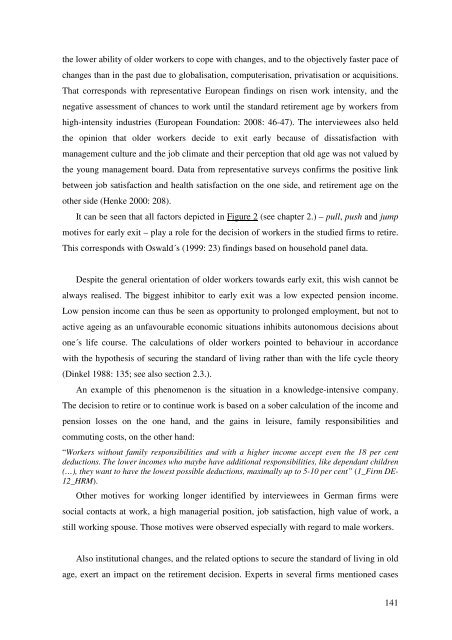Dissertation_Paula Aleksandrowicz_12 ... - Jacobs University
Dissertation_Paula Aleksandrowicz_12 ... - Jacobs University
Dissertation_Paula Aleksandrowicz_12 ... - Jacobs University
Create successful ePaper yourself
Turn your PDF publications into a flip-book with our unique Google optimized e-Paper software.
the lower ability of older workers to cope with changes, and to the objectively faster pace of<br />
changes than in the past due to globalisation, computerisation, privatisation or acquisitions.<br />
That corresponds with representative European findings on risen work intensity, and the<br />
negative assessment of chances to work until the standard retirement age by workers from<br />
high-intensity industries (European Foundation: 2008: 46-47). The interviewees also held<br />
the opinion that older workers decide to exit early because of dissatisfaction with<br />
management culture and the job climate and their perception that old age was not valued by<br />
the young management board. Data from representative surveys confirms the positive link<br />
between job satisfaction and health satisfaction on the one side, and retirement age on the<br />
other side (Henke 2000: 208).<br />
It can be seen that all factors depicted in Figure 2 (see chapter 2.) – pull, push and jump<br />
motives for early exit – play a role for the decision of workers in the studied firms to retire.<br />
This corresponds with Oswald´s (1999: 23) findings based on household panel data.<br />
Despite the general orientation of older workers towards early exit, this wish cannot be<br />
always realised. The biggest inhibitor to early exit was a low expected pension income.<br />
Low pension income can thus be seen as opportunity to prolonged employment, but not to<br />
active ageing as an unfavourable economic situations inhibits autonomous decisions about<br />
one´s life course. The calculations of older workers pointed to behaviour in accordance<br />
with the hypothesis of securing the standard of living rather than with the life cycle theory<br />
(Dinkel 1988: 135; see also section 2.3.).<br />
An example of this phenomenon is the situation in a knowledge-intensive company.<br />
The decision to retire or to continue work is based on a sober calculation of the income and<br />
pension losses on the one hand, and the gains in leisure, family responsibilities and<br />
commuting costs, on the other hand:<br />
“Workers without family responsibilities and with a higher income accept even the 18 per cent<br />
deductions. The lower incomes who maybe have additional responsibilities, like dependant children<br />
(…), they want to have the lowest possible deductions, maximally up to 5-10 per cent” (1_Firm DE-<br />
<strong>12</strong>_HRM).<br />
Other motives for working longer identified by interviewees in German firms were<br />
social contacts at work, a high managerial position, job satisfaction, high value of work, a<br />
still working spouse. Those motives were observed especially with regard to male workers.<br />
Also institutional changes, and the related options to secure the standard of living in old<br />
age, exert an impact on the retirement decision. Experts in several firms mentioned cases<br />
141
















